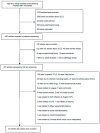Systemic Capillary Leak Syndrome (Clarkson Syndrome) in Cancer Patients: A Systematic Review
- PMID: 30404164
- PMCID: PMC6262589
- DOI: 10.3390/jcm7110418
Systemic Capillary Leak Syndrome (Clarkson Syndrome) in Cancer Patients: A Systematic Review
Abstract
Systemic capillary leak syndrome (SCLS) is a rare disease characterized by shock caused by capillary hyperpermeability. The disease can occur in cancer patients and effective therapeutic strategies have not been established yet. The aim of the study was to analyze the clinical and laboratory data, treatment modalities, and mortality rate of patients and to identify contributing factors leading to mortality of SCLS in cancer. We searched MEDLINE (inception to July 2018) and of 4612 articles, we identified 62 case reports on SCLS associated with cancer or cancer-related drugs in a total of 53 articles. SCLS was associated with cancer itself in 43.6%, with anti-cancer agents in 51.6% and bone marrow transplantation (BMT) in 4.8%. Among anti-cancer agents, granulocyte-colony stimulating factor (G-CSF) was the most frequently associated drug (14.6%), followed by interleukin (IL)-2 (11.4%). The most common associated malignancies were hematologic (61.3%) with non-Hodgkin lymphoma (22.7%) and multiple myeloma (12.9%) being the leading causes. Common symptoms and signs included dyspnea (27.4%), edema (67.7%), hypotension (32.2%), pleural effusion (29.0%), ascites (22.7%), oliguria (22.7%), and weight gain (21.0%). Patients with SCLS were treated with steroids (59.7%), volume replacement (33.8%), diuretics (24.2%), inotropes (9.6%), methylxanthines (12.8%), β2 agonists (4.8%), while intravenous immunoglobulins (IVIG) were administered in 2 patients (3.2%) only. Among sixteen deaths during follow-up, four were directly attributed to SCLS. Hematologic malignancies were associated with an increased risk for mortality (hazard ratio (HR) 8.820, 95% confidence interval (CI) 1.126⁻69.063, p = 0.038). Taken together, SCLS can be one important adverse event in cancer patients and careful monitoring of fluid volume is required in the management of SCLS.
Keywords: cancer; interleukin-2; intravenous immunoglobulins; steroids; systemic capillary leak syndrome.
Conflict of interest statement
The authors declare no conflict of interest.
Figures
References
-
- Eo T.S., Chun K.J., Hong S.J., Kim J.Y., Lee I.R., Lee K.H., Eisenhut M., Kronbichler A., Shin J.I. Clinical presentation, management, and prognostic factors of idiopathic systemic capillary leak syndrome: A systematic review. J. Allergy Clin. Immunol. Pract. 2018;6:609–618. doi: 10.1016/j.jaip.2017.07.021. - DOI - PubMed
LinkOut - more resources
Full Text Sources



